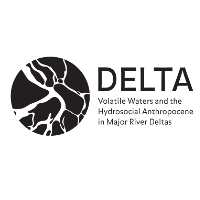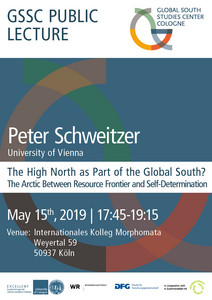Peter Schweitzer von der Universität Wien, Österreich, wird am 15. Mai einen Vortrag im Rahmen der öffentlichen Vortragsreihe des GSSC halten, unter dem Titel:
The High North as Part of the Global South?
The Arctic Between Resource Frontier und Self-Determination
Der öffentliche Vortrag findet am Internationalen Kolleg Morphomata (Weyertal 59, 50937 Köln) von 17:45-19:15 statt.
Wir freuen uns nicht nur besonders auf den Vortrag, weil die Frage nach der Beziehung zwischen staatlicher bzw. privater Ressourcengewinnung und das Wohlergehen von einzelnen Gemeinschaften wichtige Themen im DELTA-Projekt sind, sondern auch, weil der Sprecher einer der externen Partner unseres Projekts ist.
Peter Schweitzer fasst seine Präsentation wie folgt zusammen:
Today, residents of the High North are citizens of eight so-called “Arctic states”, all of which are relatively affluent on a global scale. At the same time, many indigenous communities in the Arctic and Subarctic live in desperate economic and social circumstances, as a kind of “Third World” within the “First World”, and many of these circumstances are the result of traumatic colonial histories. Still, parts of the circumpolar North have been the stage for relatively successful struggles for economic, social, and cultural rights, while other parts – or, in some cases, the same parts – have attracted growing attention from national and international resource extraction companies. The talk acknowledges the sociopolitical heterogeneity of the North and explores different local and regional articulations of the relationship between state and/or private resource extraction pressures and the well-being of individual communities. The goal is not to provide a firm answer to the title question but to introduce arctic examples of success and failure into global debates.
Peter Schweitzer ist Professor und Vorsitzender des Instituts für Sozial- und Kulturanthropologie an der Universität Wien und emeritierter Professor an der University of Alaska Fairbanks. Seine Interessen in der Theorie reichen von Verwandschafts- und Identitätspolitik bis zu Mensch-Umwelt-Interaktionen, einschließlich des sozialen Lebens von Infrastruktur und der Auswirkungen des globalen Klimawandels auf Gemeinschaften. Zu seinen regionalen Schwerpunkten zählen der zirkumpolare Norden und die ehemalige Sowjetunion.
Schweitzer ist ehemaliger Präsident der International Arctic Social Sciences Association und ehemaliger Vorsitzender der Arbeitsgruppe für Sozial- und Humanwissenschaften des International Arctic Science Committee (IASC). Er ist Herausgeber von Dividends of Kinship (Routledge 2000) sowie Mitredakteur von Hunters and Gatherers in the Modern World (Berghahn 2000), Arctic Social Indicators (Nordic Council of Ministers 2020), und Arctic Social Indicators II: Implementation (Nordic Council of Ministers 2014). Schweitzer ist außerdem Co-Autor von Russian Old-Settlers of Siberia (Novoe izdatel'stvo, 2004; in russisch) und von Arctic Sustainability Research (Routledge, 2017).

